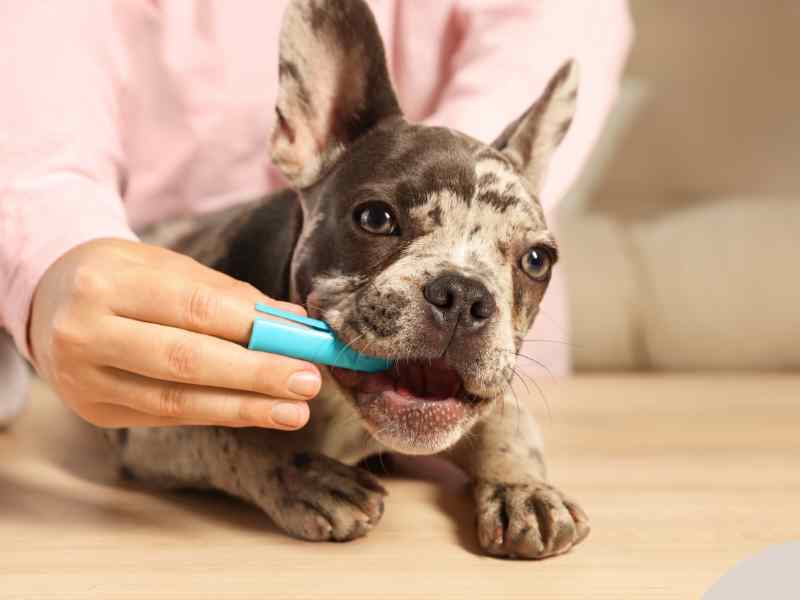When it comes to taking care of our furry friends, we often focus on diet and exercise, but do we pay enough attention to dog oral hygiene? It might come as a surprise, but the state of your dog’s teeth and gums can directly impact their heart health. That’s right, poor oral health in dogs can mean not great health for their hearts, too. The good news is there are things you can do to make sure that both oral and heart health are in great shape!
Understanding Dog Oral Health
We say it all the time: taking care of your dog’s oral health is more than just about avoiding bad breath and dirty teeth. We have always believed that good health starts from the inside, and so preventing dental disease in dogs starts from the inside, too. For us, it’s about preventing a series of health issues that can affect our dogs’ quality of life and even their lifespans. Plaque and tartar buildup in dogs, if left unchecked, can lead to periodontal disease, the most common dental condition in dogs after the age of three. But what does this mean for your furry best friend, and what can you do to make sure they’re healthy and happy?
Common Dental Disease Issues in Dogs
Just like humans, dogs get plaque on their teeth, which can harden into tartar if not regularly cleaned away. This can lead to periodontal disease in dogs, which is an infection of the structures around the teeth, including their gums and bones. It’s painful and can lead to tooth loss and other serious health issues. It really is about more than their teeth.
Signs and Symptoms of Periodontal Disease In Dogs
What signs should you look for when deciding whether your dog may have chronic gum disease? There are, of course, the general signs you’d expect if your dog was struggling with periodontal disease or oral health issues. Dogs aren’t necessarily known for having the best breath, but if your dog seems to have bad breath that is worse than the general ‘dog breath’ we are often used to, that could be a sign. If your dog seems like they don’t have the same appetite they usually do, or it looks like they’re having a hard time eating, that may mean it’s painful because of dental disease and they’re avoiding more pain. You might see them paw at their mouth or their face, and for sure, if you see red, swollen or bleeding gums, those are signs that your dog may have dental disease. Loose or missing teeth (after they’ve lost all their baby teeth) may mean you have some issues, and believe it or not, even something as ‘quirky’ as them taking their food out of their bowl and moving it to the floor before they eat it could indicate there may be something going on with your pet’s teeth.
Gum Disease In Dogs: The Consequences of Ignoring
Ignoring your dog’s dental health doesn’t just affect their mouth. The bacteria from periodontal disease can enter the bloodstream and travel to the heart, liver, and kidneys, leading to potentially life-threatening conditions. Not to mention that the discomfort and pain associated with dental diseases can significantly impact your dog’s mood and behavior.
It’s true that a consistent oral hygiene routine for dogs is actually a part of their overall health regimen and impacts everything from your dog’s immune system to their frame of mind. And when it comes to heart diseases in dogs, there is definitely a link you should know about so you can take proactive steps for their health and happiness.
The Connection Between Oral Health and Heart Disease in Dogs
A healthy mouth is more than just a gateway to a healthy body for our dogs; it’s a critical, first line of defense against serious health issues, including heart disease. The link between dental health and heart health in dogs is both significant and scientifically proven, with research underscoring the importance of oral hygiene for overall wellness.
Scientific Evidence Of Dog Dental Disease And Heart Link
One of the most compelling pieces of evidence comes from a study conducted by Purdue University’s School of Veterinary Medicine. This landmark research found that dogs with advanced periodontal disease are at a higher risk for heart conditions. The study specifically highlighted the presence of endocarditis, an infection of the heart’s inner lining, as significantly more common in dogs with severe dental problems. The bacteria from the mouth can enter the bloodstream through diseased gums, travel to the heart, and attach to the valves, leading to serious cardiovascular issues. Science continues to confirm that the link between an increased risk of heart disease in dogs and oral health is one we just can’t ignore if we want to keep them their healthiest.
Recognizing the signs of heart disease in your dog early on can be pivotal for their health and longevity. Some common signs that your dog may be suffering from heart disease include persistent coughing, fainting or collapsing, difficulty breathing, fatigue with less ability to exercise, and behavior changes like poor appetite or less interest in play.
Persistent coughing is often a sign you should definitely not ignore, as it could mean that there is fluid accumulation in the lungs due to the heart not pumping efficiently. Difficulty breathing may also present as rapid or forceful breathing, and dogs with severe heart conditions may avoid lying down due to the increased trouble it causes them. Fainting or collapsing can occur when the brain and other vital organs are deprived of nutrients, especially oxygen, due to compromised blood flow. And just like humans, a dog with heart disease may show signs of getting tired more quickly than usual, even during their routine walks or exercise. Behavior changes such as a lack of appetite or a sudden disinterest in interaction can also be tell-tale signs.
Diagnostic tests are critical for determining if these symptoms are indeed the effects of heart disease. Veterinarians will use physical examination, chest X-rays, electrocardiograms (ECG), echocardiograms, and blood tests to diagnose heart conditions in dogs. X-rays can reveal the size of the heart and any fluid buildup, while an ECG is best for detecting arrhythmias. An echocardiogram, or heart ultrasound, is a noninvasive test that can provide detailed information about the heart’s condition and function.
If you notice any of these symptoms in your dog, it’s important to consult with a veterinarian. They can conduct these necessary tests to diagnose the issue and recommend appropriate treatment strategies, which could include diet therapy, activity modification, and therapeutics, to help manage the condition and improve your dog’s quality of life.
Understanding the Risks Of Poor Dog Oral Health
The scientific connection between your dog’s mouth and heart points out a truly critical point: oral health issues in dogs are not confined to their mouths but can have far-reaching implications on a dog’s heart health. The Purdue study serves as a crucial reminder of how overall health is affected by seemingly isolated issues, where infection in one part of the body can lead to serious complications elsewhere, particularly in vital organs like the heart.
The Importance of Proactive Dog Dental Care
Given this connection, the importance of daily oral hygiene practices is super important. Preventing plaque and tartar buildup through brushing, a good diet, dental toys, and dental chews can significantly reduce the risk of periodontal disease and, by extension, heart disease. It’s not just about avoiding bad breath or dental discomfort; it’s about protecting your dog’s heart and extending their life.
At Bernie’s Best, we focus on science-based insights and solutions for your dog’s health because we first started with our own dogs. Science continues to show us how important taking care of our dogs from the inside out is, and that’s the motivation behind Bernie’s Charming Chompers.
Preventing Heart Disease Through Oral Hygiene
When it comes to guarding against heart disease in our dogs, the daily dental routine you establish can make all the difference. While brushing your dog’s teeth is obviously important, there are other everyday actions that also truly add up to a healthy heart. Working on your dog’s oral gut health from the outside in, combined with the physics of an abrasive dental chew, is something that’s easy for you to do and delicious for your dog.
A Diet for Dental Health
A healthy diet is the first step towards a healthy mouth. Foods that are rich in fiber and formulated for better digestive health can help in two ways: they physically clean the teeth through the chewing process, and they support the digestive system, which we know is linked to oral health. Ingredients like sweet potato, real turkey, pumpkin, yogurt, and blueberries aren’t just tasty; they provide prebiotics, postbiotics, and a host of other benefits that contribute to a healthier gut and, in turn, a healthier mouth.
Daily Brushing For Dogs? The Beginning of Dental Care
When you decide to brush your dog’s teeth, opt for a toothpaste that’s formulated specifically for dogs, containing enzymes that help break down plaque and bacteria. Aim to brush your dog’s teeth daily. Start slow, with gentle strokes, and work up as they become more comfortable with the process.
Smart Supplementing with Dental Diets
If your dogs are like ours, they may not necessarily consider brushing a habit they love. We get it. That’s why incorporating dental diets into your dog’s feeding regime can support oral hygiene efforts. These diets are typically high in specific nutrients that bolster dental health and are another way to tackle plaque and tartar buildup. Foods that don’t just feed your dog but help clean their teeth with every bite are a great way to help ensure you’re scraping away at tartar and plaque as well as encouraging good nutrient absorption.
Bernie’s Charming Chompers: The Power of Dental Chews
Dental chews are a fantastic way to help dogs have better oral health. They work mechanically by scraping away plaque as your dog chews, but the best ones also work from the inside out. When we designed our chews, we wanted to attack the root source of oral problems with ingredients that also promote gut health. A balanced gut flora means less harmful bacteria in the mouth, which can lead to better oral health and a lower risk of heart disease.
By focusing on these daily practices and incorporating the right ingredients, you can provide your dog with the best defense against periodontal disease and its ripple effects on the heart. Remember, a good chew isn’t just a treat; it’s an integral part of your dog’s health routine, working well after the chewing stops.


